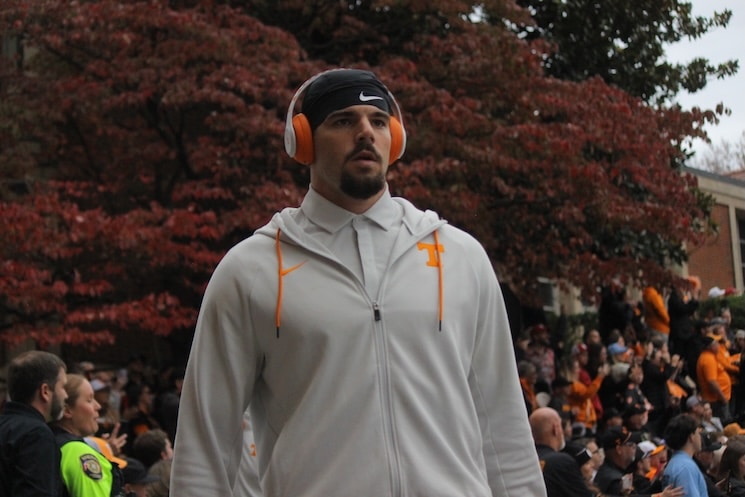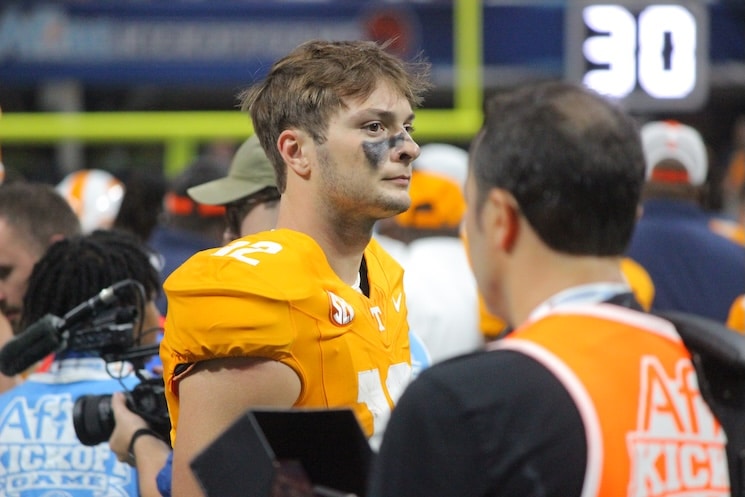
Coming out of high school, neither Admiral Schofield nor Kyle Alexander were highly regarded by basketball scouts or major conference teams. Schofield was mostly getting looks from mid-major schools, and Tennessee’s main competition for Alexander was New Mexico.
According to the 247Sports Composite rankings, Schofield was just the No. 251 overall prospect in the 2015 cycle, and Alexander was only the 362nd overall player in that same class.
Tennessee head coach Rick Barnes pursued Alexander and signed him in the spring singing period as part of UT’s 2015 signing class shortly after he was hired as head coach, but he didn’t recruit Schofield to Tennessee. Barnes inherited Schofield from Donnie Tyndall’s recruiting efforts, and the two didn’t actually get along and mesh well together at first.
In fact, if you asked a lot of media members and fans about Schofield in his first year as a Vol, many would tell you they didn’t think he would cut it at Tennessee.
I got to see Schofield firsthand during the now-defunct Rocky Top League. I wasn’t very impressed with what he brought to the court, and I wasn’t the only one. Reed Carringer, who helps run the Football Time and Basketball Time in Tennessee magazines and used to be a part of the RTI team, has said on multiple occasions that he thought Schofield was overweight when he first arrived at UT and didn’t look like he belonged on Tennessee’s roster. Former Vol Mark Griffin has said as much both to me in an interview I did with him and on Tony Basilio’s radio show.
But Schofield proved all his doubters wrong. And he did so in a big way. More on that in a second, though.
Alexander had some tools and looked like he would be a decent project player, but he had the opposite problem of Schofield; he was underweight and really could’ve used a redshirt year.
Unfortunately for Alexander, Tennessee couldn’t afford for him to ride the bench in his first year as a Vol.
The Vols only had two players aside from Alexander who were 6-foot-8 or taller on their roster at the start of the 2015-16 season, and neither one of those players were ready to play a lot of minutes. Derek Reese started 15 games and played in all 34 for the Vols that year, averaging 19.2 minutes per contest. Ray Kasongo played even fewer minutes, only appearing in 24 games and averaging 5.5 minutes a game.
As a skinny 6-foot-10 freshman, Alexander played in 32 games and made 11 starts, averaging 12.2 minutes per game. He only averaged 1.7 points and 3.2 rebounds that season, shooting 43.2 percent from the floor.
For Schofield, his freshman year wasn’t a whole lot better.
In his first year with Tennessee, Schofield played in 32 games and made 22 starts. He averaged 7.6 points and 4.0 rebounds in his 18.7 minutes per game, and he showed more flashes of potential than many expected. But he still looked a long way off from being a high-level contributor.
Then in his second season with the Vols, he hit a road bump.
Schofield was suspended for three games for an undisclosed violation of team rules early in UT’s 2016-17 season, and it was clear that he and Barnes weren’t on the same page. But once he served his suspension and began to take to what Barnes and his staff were preaching, things began to turn around for the Zion, Illinois native.
Once the Vols entered SEC play that season, Schofield found an extra gear. He scored 18 points against Florida, the second-highest total of his career up to that point, and he would go on to score in double figures in eight of his next 17 games.
Alexander took some more steps in the right direction for the Vols as well, playing in 32 games and starting 23 all while averaging 3.3 points and 4.0 rebounds in 14.0 minutes per game.
Then came the galvanizing moment for both players and Tennessee’s team in general after the 2016-17 season.
Barnes addressed his team after their SEC Tournament loss to Georgia in 2017, and he told his players they weren’t tough enough. Things had to change, and the players who were serious about getting better and getting tougher would need to step up and help solidify the foundation he and his coaching staff were trying to build.
Schofield and Alexander bought in to Barnes’ message, and they helped spearhead the massive change during the offseason between the 2016-17 season and the 2017-18 season.
Alexander packed on more pounds and embraced his role as a rim protector all while working on his offensive skill set. Schofield continued to transform his body and convert fat to muscle. It wasn’t just those two, however. Grant Williams, a rising sophomore at the time, worked on improving his game, as did Jordan Bone, Jordan Bowden, and Lamonte Turner.
It was the 2017-18 season where Tennessee burst back onto the national scene in college basketball, and Schofield and Alexander were big reasons why. Both were full-time starters for the Vols that season, and both had breakout campaigns. Alexander increased his shooting percentage from 46.6 percent as a sophomore to a whopping 68.1 percent as a junior, and he averaged 5.6 points and 5.6 rebounds while also blocking 1.7 shots a game.
In fact, if Alexander hadn’t gotten hurt in the Vols’ first round NCAA Tournament game against Wright State and missed their contest against Loyola-Chicago, who knows how far the Vols could’ve gone in the tournament last year. Alexander was a huge contributor on UT’s defense as a junior, and the Vols desperately missed his post presence against the Ramblers.
Schofield also enjoyed a career year, and he grabbed national attention because of his torrid close to the season.
Starting with Tennessee’s win over Ole Miss on February 24th, Schofield would go on a tear to end the season for the Vols. He dropped 25 points on the Rebels in that game, starting a three-game streak of scoring at least 20 points. The Vols won all three of those games, and they closed the regular season on a four-game winning streak and won a share of the SEC regular season title.
But Schofield was just getting started.
Schofield averaged 17 points and 8.3 rebounds in the Vols’ three SEC Tournament games, and he had back-to-back games with a double-double in the Vols’ loss to Kentucky in the SEC Tournament Final and in their first round game against Wright State in the NCAA Tournament.
Now in their last seasons with Tennessee, both Alexander and Schofield are averaging career-highs in a number of categories in their second years as full-time starters.
Schofield is averaging 16.4 points, 6.4 rebounds, and 2.1 assists all while shooting 47.5 percent from the field. Alexander has struggled with foul trouble as of late, but he’s still averaging career-highs in points per game (7.7) and rebounds per game (6.5) and has more double-doubles this season (3) than he did in his previous three years as a Vol combined (2).
Both of Tennessee’s scholarship seniors are a testament to the culture they helped develop and the developmental skills of UT’s coaching staff. Neither Schofield nor Alexander were expected to be major contributors for the Vols during their careers when they first arrived, but now Schofield is a First Team All-SEC performer and Alexander is intriguing enough to scouts that he could work his way onto an NBA roster.
If either player didn’t buy in to what Barnes and his staff preached and if either player hadn’t put in all the hard work and practiced their tails off the way they have, Tennessee’s basketball program wouldn’t be in as good of shape as it is now.
Tuesday night will mark the last time both players will wear a Tennessee uniform in Thompson-Boling Arena. And when you look back on the journey of how they got here, it almost seems impossible to think that UT and these two players themselves are in this position.
When both players came to UT, the Vols’ program was at its worst, and neither player had a lot of expectations on them. The Vols were coming off a 16-16 season and just hired their third coach in three years when Schofield and Alexander first joined Tennessee. Those two suffered through a 15-19 campaign and then a 16-16 season in their first two years wearing the orange and white.
Then, they helped Tennessee win their first share of an SEC regular season title since 2008, and they helped get the Vols back into the NCAA Tournament for the first time since 2014. This year, they’ve experienced Tennessee being No. 1 in the AP Poll for four consecutive weeks, and they helped set a program record with a 19-game winning streak.
Tuesday night will be the last time either senior plays in Thompson-Boling Arena, but their story isn’t over as Vols. Tennessee’s season is still ongoing, and they’ve already helped UT set several school records during this season. There’s still more history up for grabs, and you can bet both Schofield and Alexander will do everything they can to help their team achieve those unprecedented heights.
Four years ago, nobody thought the Vols would be where they are now in men’s basketball. And both Admiral Schofield and Kyle Alexander are huge reasons why Tennessee has gotten here.



